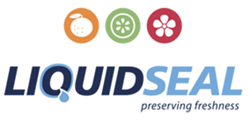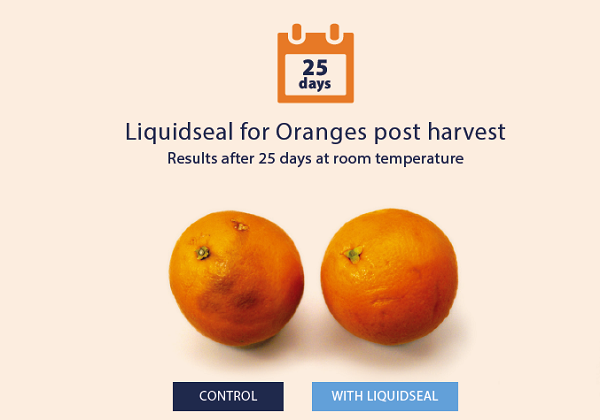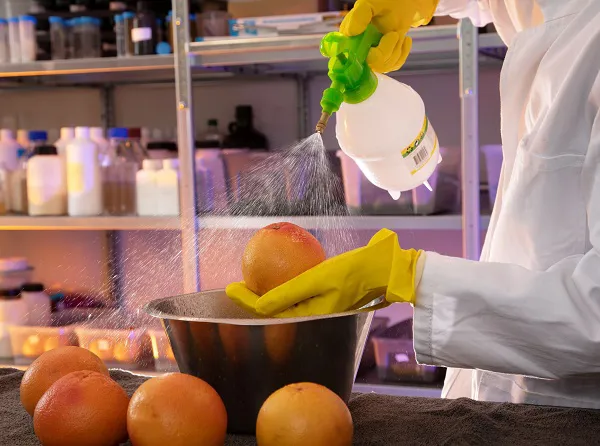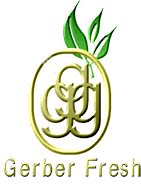 After several years of using Liquidseal on South African citrus, both organic and conventional, with the support of Citrus Research International, the Dutch company is at the point of scaling up the presence of its product in the country.
After several years of using Liquidseal on South African citrus, both organic and conventional, with the support of Citrus Research International, the Dutch company is at the point of scaling up the presence of its product in the country.
Liquidseal, represented by Gerber Fresh in South Africa, therefore invites citrus growers to test their plant-based coating this season at commercial trial rates.
The compostable coating slows down the metabolism and thus the decay of fresh produce, while simultaneously protecting the peel’s lenticels against damage such as can be caused by cold shipping regimes.
Since the start of trials with Liquidseal on the citrus of companies like the Sundays River Citrus Company in the Eastern Cape and Orex Exports in the Northern Cape, they have steadily been accumulating evidence of Liquidseal’s ability to extend the shelf life of perishable products and to reduce cold damage.
Gerber Fresh notes that South African citrus growers report a dramatic reduction in rind discolouration and mould with Liquidseal
“We’re more than happy to prove it to growers,” says Ronald van Bilsen, sales manager at Liquidseal’s headoffice in The Netherlands, “and if they’re ready, we’d like to show it to them. If you really take up your role as a responsible part of the supply chain and you want to embrace the sustainability agenda, then you should be working with an innovative product like Liquidseal.”
Liquidseal: a sustainable and game-changing solution
Fred Stevenson of Gerber Fresh remarks that the producers with whom they’ve been working report a dramatic reduction in rind discolouration, especially on organic citrus, with even ripening and lower incidence of mould.
Unlike a wax coating, which forms a static barrier, Liquidseal provides channels to manage the exchange of oxygen and carbon dioxide within the fruit, Fred explains. Liquidseal is biodegradable and compostable.
Using Liquidseal changes nothing in a packhouse, Fred says. At the wax bath, the same applicator can be used to apply LiquidSeal. In packhouses using Liquidseal and conventional wax, a deep cleanse between each packing regime would be required.
Gerber Fresh has, apart from the trials on citrus, also used Liquidseal’s sustainable coating for hard shell fruit on South African avocados, mangos, and papaya.
Using Liquidseal, Hoedspruit mango grower Mohlatsi Fruit has been able to hold back part of their mango crop until the end of the season to capitalize on an empty market.
Reducing food waste should be non-negotiable in the supply chain
Jeanette van der Nest of Gerber Fresh observes that retailers habitually work into their pricing structure a generous margin to account for perishable product going to waste.
“If we can convince them that the 20% that they are paying for product that they expect will go to waste, they'll have a fifth more product to sell and they can take that off their wastage percentage. Now they’re not going to need to throw away fruit or vegetables or to sell it at discounted prices.”

Photos supplied by Liquidseal
In South Africa, where a significant portion of the population is not food-secure, a third of food goes to waste, Fred points out. Just over 20% is lost in the supermarket, while 30% is lost at consumers’ homes - especially for low-income consumers who don’t own fridges or, increasingly, as a result of power cuts.
Ronald uses the example of food in avocados. “If you want to have ten avocados, you start with nineteen. What happens to the extra nine avocados? Four of them will be wasted at the supply side, mainly from the grower to the country of destination. During distribution in the country of destination one avocado is lost, at retail level another one, and then at the home of the shopper three avocados of the nine go to waste.”
Liquidseal targets the nexus of food waste and plastic packaging
He continues: “Liquidseal is in the sweet spot of three trends: reducing food wastage, reducing plastic packaging’s, and reducing the use of chemicals. The big opportunity to reduce waste exists in first instance at supply chain level, and then at the consumer.”
Liquideal’s fully EU and FDA compliant range of coatings are internationally synonymous with innovation and quality in the postharvest industry. Our award-winning products comply with even the strictest requirements of zero tolerance countries.
In Mexico, Ecuador, Peru, Colombia, Brazil as well as India, Liquidseal works with distribution agents like Gerber Fresh with whom they work in South Africa.
 For more information:
For more information:
Jeanette van der Nest & Fred Stevenson
Gerber Fresh
Tel: (+27) 10 001 5222
Email: info@gerberfresh.co.za
https://gerberfresh.co.za/
https://www.liquidseal.nl/
